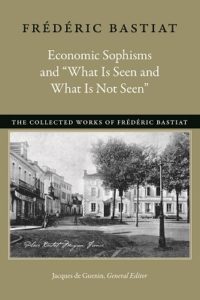Economic Sophisms
By Frédéric Bastiat
Frédéric Bastiat (1801-1850) was a French economist, statesman, and author. He was the leader of the free-trade movement in France from its inception in 1840 until his untimely death in 1850. The first 45 years of his life were spent in preparation for five tremendously productive years writing in favor of freedom. Bastiat was the founder of the weekly newspaper
Le Libre Échange, a contributor to numerous periodicals, and the author of sundry pamphlets and speeches dealing with the pressing issues of his day. Most of his writing was done in the years directly before and after the Revolution of 1848—a time when France was rapidly embracing socialism. As a deputy in the Legislative Assembly, Bastiat fought valiantly for the private property order, but unfortunately the majority of his colleagues chose to ignore him. Frédéric Bastiat remains one of the great champions of freedom whose writings retain their relevance as we continue to confront the old adversary.
Translator/Editor
Arthur Goddard, trans., trans.
First Pub. Date
1845
Publisher
Irvington-on-Hudson, NY: The Foundation for Economic Education, Inc.
Pub. Date
1996
Comments
Introduction by Henry Hazlitt
Copyright
The text of this edition is under copyright
- About the Author
- Preface to the English-Language Edition, by Arthur Goddard
- Introduction, by Henry Hazlitt
- S.1, Author's Introduction to the French Edition
- S.1, Ch.1, Abundance and Scarcity
- S.1, Ch.2, Obstacle and Cause
- S.1, Ch.3, Effort and Result
- S.1, Ch.4, Equalizing the Conditions of Production
- S.1, Ch.5, Our Products Are Burdened with Taxes
- S.1, Ch.6, The Balance of Trade
- S.1, Ch.7, A Petition
- S.1, Ch.8, Differential Tariffs
- S.1, Ch.9, An Immense Discovery
- S.1, Ch.10, Reciprocity
- S.1, Ch.11, Money Prices
- S.1, Ch.12, Does Protectionism Raise Wage Rates
- S.1, Ch.13, Theory and Practice
- S.1, Ch.14, Conflict of Principles
- S.1, Ch.15, Reciprocity Again
- S.1, Ch.16, Obstructed Rivers as Advocates for the Protectionists
- S.1, Ch.17, A Negative Railroad
- S.1, Ch.18, There Are No Absolute Principles
- S.1, Ch.19, National Independence
- S.1, Ch.20, Human vs. Mechanical Labor and Domestic vs. Foreign Labor
- S.1, Ch.21, Raw Materials
- S.1, Ch.22, Metaphors
- S.1, Ch.23, Conclusion
- S.2, Ch.1, The Physiology of Plunder
- S.2, Ch.2, Two Systems of Ethics
- S.2, Ch.3, The Two Hatchets
- S.2, Ch.4, Subordinate Labor Council
- S.2, Ch.5, High Prices and Low Prices
- S.2, Ch.6, To Artisans and Laborers
- S.2, Ch.7, A Chinese Tale
- S.2, Ch.8, Post Hoc, Ergo Propter Hoc
- S.2, Ch.9, Robbery by Subsidy
- S.2, Ch.10, The Tax Collector
- S.2, Ch.11, The Utopian
- S.2, Ch.12, Salt, the Postal Service, and the Tariff
- S.2, Ch.13, Protectionism, or the Three Aldermen
- S.2, Ch.14, Something Else
- S.2, Ch.15, The Little Arsenal of the Freetrader
- S.2, Ch.16, The Right Hand and the Left
- S.2, Ch.17, Domination through Industrial Superiority
About the Author
Frédéric Bastiat (1801-1850) was a French economist, statesman, and author. He was the leader of the free-trade movement in France from its inception in 1840 until his untimely death in 1850. The first 45 years of his life were spent in preparation for five tremendously productive years writing in favor of freedom. Bastiat was the founder of the weekly newspaper
Le Libre Échange, a contributor to numerous periodicals, and the author of sundry pamphlets and speeches dealing with the pressing issues of his day. Most of his writing was done in the years directly before and after the Revolution of 1848—a time when France was rapidly embracing socialism. As a deputy in the Legislative Assembly, Bastiat fought valiantly for the private property order, but unfortunately the majority of his colleagues chose to ignore him. Frédéric Bastiat remains one of the great champions of freedom whose writings retain their relevance as we continue to confront the old adversary.
* Each footnote is marked in the text by a colored-coded superscript and in this footnote file according to its authorship as follows:
- The author’s original notes, color-coded red in the text, are unbracketed and unlabeled below.
- The French editor’s notes, color-coded purple in the text, are bracketed and labeled “EDITOR” below.
- The translator’s notes, color-coded blue in the text, are bracketed and labeled “TRANSLATOR” below.
Notes to “Introduction,” by Henry Hazlitt.
Notes to “Author’s Introduction to the French Edition.”

